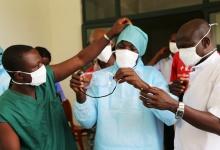
Typical street scene in Santa Ana, El Salvador. (Photo: iStock)
IMF Survey : Affected Countries Working on Post-Ebola Recovery Plan
October 11, 2014
- Finance ministers of Guinea, Liberia, Sierra Leone agree on strategy
- Ebola outbreak reverses recent economic progress in affected states
- Ebola spillover effects beginning to be felt in other African countries
The three countries worst hit by the Ebola outbreak in West Africa are working on a post-Ebola recovery plan, Sierra Leone Finance Minister Kaifala Marah said.

Medical workers prep in Freetown, Sierra Leone: ‘We were doing well … and then came Ebola,’ Finance Minister Marah said (photo: Huang Xianbin/Xinhua)
AFRICAN FINANCE MINISTERS
He told an October 11 news conference during the 2014 IMF–World Bank Annual Meetings in Washington, D.C., that he had recently met with the finance ministers of Guinea and Liberia to explore a post-Ebola strategy.
“We have decided that we will come up with a holistic strategy that we will share with our partners, both bilateral and multilateral,” Marah said, adding that the three ministers had resolved to “use country strategies to be able to help our countries out.”
Marah recalled that thanks to its strong mining sector, Sierra Leone had for the last few years been one of Africa’s fastest-growing economies. “Our growth rate for this year was set for 11.3 percent, we were doing well and our macroeconomic fundamentals were also strong. We were doing well on roads, on energy, on tourism, on agriculture.”
Foreign investment flows were also buoyant as the country attracted major companies, Marah stated. The government was even reviewing its 2035 target date for Sierra Leone attaining middle–income country status, with a view to bringing the date forward.
‘Then came Ebola’
“Then came Ebola, in May, and everything was reversed,” Marah said. “Ebola has made me appreciate and begin to understand that fragility is self reinforcing, because if we had had the right infrastructure, the right institutions, and the right human capacity to be able to confront Ebola, we would not have suffered as we have.”
Marah said mining companies were cutting back operations in Sierra Leone and manufacturing activity has declined. “Cocoa and coffee, which account for 90 percent of agricultural exports, is also at the bottom now, because people have abandoned their farms—everybody is running away from Ebola. Construction also is bad, because many of the contractors have abandoned their sites.
“Tourism is down 50-60 percent. Air travel is about to stagnate and strangle the whole subregion. We have been isolated. Whether that is a global best practice or strategy, someone has to advise us. But it really is killing our economies,” Marah said, adding that the isolation amounted to an “economic embargo” on the subregion.
Marah welcomed the international response to the Ebola outbreak. “The world has responded. It has been slow and it has been late, but we are delighted that the world has recognized that Ebola is not only a subregional thing: it’s a global challenge to humanity.”
Spillover effects
Kenyan Treasury Secretary Henry Rotich said the Ebola outbreak is also having spillover effects in East Africa. “In Kenya we have had tourism cancellations which have affected our growth, and we have revised our growth down this year.” Kenya’s position as a regional hub means it has seen transportation being affected by Ebola effects, and this was affecting the overall growth outlook, Rotich added.
Rotich said the Kenyan government is worried about economic prospects in the euro area—destination for most of Kenya’s exports. Strong growth in sub-Saharan Africa, another key Kenyan export market, could also weaken as a result of the Ebola outbreak, and this is also an area of potential vulnerability for the Kenyan economy.
Importance of stability
Chad’s Minister of Finance and Budget, Bedoumra Kordje, highlighted security as a factor affecting economic growth in Africa. “Stability is an issue for much of Africa, and we must integrate this into our analysis and evaluations.”
Kordje said Chad, in particular, is ready to champion this cause because the country is in its longest period of stability since independence, and the country is reaping the rewards of its achievement.
But Chad is also surrounded by threats to its security, Kordje stated. “That means we must invest in security, because it is simply part of our reality if we wish to maintain the stability of our country.”
Kordje also stressed that there could be no development without infrastructure. “But infrastructure is expensive, and Africa cannot finance it with concessional financing. We need grants, without which we will stagnate or go backwards.”
He said low-income countries cannot fulfill their wider development ambitions either if the financial assistance offered is only on a concessional basis. Grants are the best way to finance the lasting growth of poor countries, Kordje said.
Peace dividend
Guinea-Bissau’s Minister of Economy and Finance, Geraldo Joao Martins, said the country was enjoying a “peace dividend” after the elections and new economic policies that followed its 2012 military coup. A spirit of national reconciliation had been generated by the inclusion of elements of the political opposition as part of the government.
“We are mobilizing all the resources in the public and private sectors to support the rebuilding of a new nation. Our country has enormous potential in the areas of agriculture, fish, tourism, mines, which are still not being exploited fully,” Martins said.







